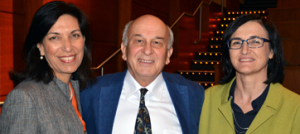
Our first “AICARDI SYNDROME RESEARCH SYMPOSIUM AND WORKSHOP” was held on October 11, 2013 in the Jan and Dan Duncan Neurological Research Institute (NRI) at Texas Children’s Hospital and Baylor College of Medicine in Houston Texas on behalf of the Aicardi Syndrome Foundation and the many families of children with Aicardi syndrome.
The need for such a symposium was jointly decided by researchers in the field and the leadership of the Aicardi Syndrome Foundation at the family conference in July 2012, because much to our surprise and disappointment, the cause of Aicardi syndrome has remained elusive. This unfortunately was not for lack of years of active research using modern genetic and genomic research tools as they came along, including candidate gene analysis, DNA copy number analysis using genome-wide arrays, and high throughput DNA sequencing of the whole X-chromosome, whole exome, and even the whole genome.
It was thus clear to all in the field that new ideas and approaches are needed; developing such ideas and new collaborations was precisely the motivation for this one-day symposium and workshop.
To achieve this goal, we invited a multidisciplinary group of (1) researchers and clinicians who have been working in their laboratories and with their clinical research teams on the search for the cause of Aicardi syndrome, (2) leaders who were all true forward creative thinkers in their respective areas from which Aicardi syndrome research can benefit, and (3) representatives of parents of children with Aicardi syndrome.
The symposium, of which the schedule is shown below, started with presentations by researchers and clinicians working on Aicardi syndrome who set the framework by describing the clinical features of Aicardi syndrome and their progress in various aspects of research. Talks covered clinical characterization, through medical imaging features, and their research achievements and challenges. These were followed by talks that covered other areas of research and each speaker offered insights and new ideas for areas they thought could be prioritized for future collaborative research.
We were very fortunate and honored that the eminent neuroscientist, Dr. Pasko Rakic, agreed to participate in the symposium and deliver the keynote lecture. Dr. Rakic’s lecture was immensely stimulating to all who attended it. Furthermore Dr. Rakic generously offered many excellent suggestions regarding research priorities and we are grateful that he shared his unparalleled scientific wisdom and expertise to the benefit of Aicardi syndrome research.
During lunchtime, parents presented beautiful videos of their family’s experience living with a daughter with Aicardi syndrome, which were truly heartwarming, informative and inspiring to many of the researchers in the room, most of whom had never met children with Aicardi syndrome until then.
During the afternoon, two small groups of invited speakers and participants divided up into two breakout sessions for more informal discussion on research goals and priorities for the future. Summaries were presented to the entire group for further input and eminent neuroscientist, Dr. Huda Zoghbi, director of the NRI, provided summarizing closing remarks.
All talks and presentations were followed by lively and stimulating discussions from which many research ideas and new opportunities for collaboration are now being developed. These discussions and interactions continued during the networking breaks, as well as the reception and dinner that concluded the event.
Many excellent ideas and new opportunities for collaboration resulted from this exciting day and are now being further developed. These will be summarized in a future more detailed scientific report of this symposium that will be shared with the larger research community. It was truly a wonderfully stimulating day for all present and all left with renewed enthusiasm and hope for future Aicardi syndrome research.
Our sincere gratitude goes out to the Aicardi Syndrome Foundation and the many families for their support of this symposium and workshop. We are also grateful to Texas Children’s Hospital for generously supporting the symposium by letting us use the conference facilities at the Jan and Dan Duncan Neurological Research Institute. Last but not least, we are grateful to all the speakers and invited workshop participants for their support of this program, with special appreciation to Dr. Pasko Rakic for giving the keynote lecture.
Igna Van den Veyver, MDBaylor College of Medicine and Texas Children’s Hospital
